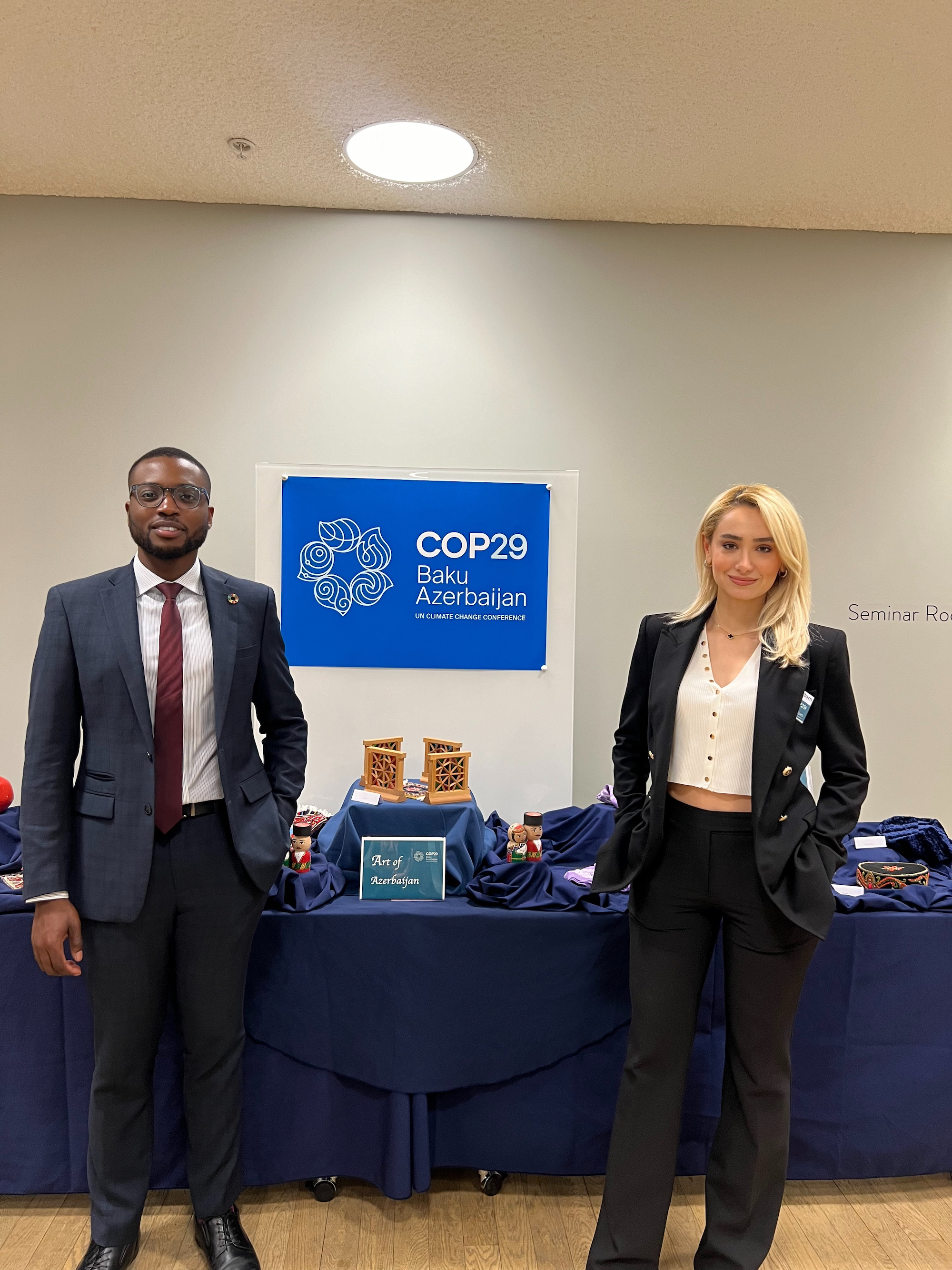Baku's Dress Rehearsal: Three Lessons from COP29 Simulation
MPP students Kay Atanda and Laman Ahmadova reflect on how immersive teaching bridges the gap between theory and practice.

In a bustling seminar room within the Blavatnik School of Government, the air crackled with tension.
Azerbaijani artwork adorned the corridors, local delicacies filled the tables, and custom backdrops transported participants to the sun-baked streets of Baku, the host city of the upcoming COP29. This wasn't just another academic exercise; it was a high-stakes simulation mirroring one of the world's most crucial climate conferences.
As part of the Master of Public Policy (MPP) programme, students found themselves thrust into the roles of global leaders, tasked with agreeing a deal to help tackle the climate crisis. The simulation, coinciding in real-time with SB60 – a COP preparatory conference in Bonn – offered a unique glimpse into the complexities of international climate negotiations.
"The simulation was a surprisingly realistic experience. It was astounding to see the similarities between our negotiations and those playing out in real-time at SB60," said Steph Barker, an MPP student who represented the UNFCCC Executive Secretary in the simulation.
COP29 holds particular significance due to its focus on climate finance. A recent report indicates that emerging markets and developing countries require $2.4 trillion annually in climate-related investments by 2030. Central to the discussions will be the redefinition of international climate finance under the New Collective Quantified Goal on Climate Finance (NCQG). This complex debate seeks to replace the previous $100 billion annual commitment made by developed economies, which was fulfilled two years behind schedule.
“The NCQG negotiations are already tense and progress has been slow. Between now and Baku we can expect the process to be painstakingly drawn-out, given the substantial gap between the financial commitments developing countries want to see and where traditional contributors feel comfortable. Perhaps we will see a negotiated floor and some guiding principles agreed, if not a new quantum,” said Professor Rachel Kyte, Professor of Climate Policy at the Blavatnik School.
This context set the stage for two days of intense negotiations, covering critical issues such as climate finance, loss and damage, and adaptation measures. Participants benefited from expert briefings and prepared strategy documents based on assigned roles. Throughout this immersive exercise, programme co-conveners closely evaluated students’ performance, with grades hanging in the balance. Dr Ẹniọlá Ṣóyẹmí, course co-convener, urged participants to "fully embody your assigned role and conduct thorough research."

As the simulation unfolded, the room buzzed with activity. Protests erupted, motions were tabled, and accusations flew across negotiating blocs. Unexpected alliances formed in hushed corridors, while stirring speeches echoed through the room. In a poignant gesture, representatives of the Alliance of Small Island States (AOSIS) placed melting ice blocks on tables, silently underscoring the urgency of the climate crisis, one that poses an existential threat to this group of vulnerable nations.
In a striking and unplanned parallel, both SB60 and the MPP simulation reached an identical agreement of a $1.1 trillion climate finance target. This convergence offers a glimmer of hope for the upcoming COP. Three key lessons emerged from the exercise:
1. Balancing Act: Shared Responsibility, Differentiated Impact
While climate change affects all countries, its impact is disproportionate. The devastating 2022 floods in Pakistan, which affected 33 million people, starkly illustrate this reality. Pakistan, contributing less than one percent of global greenhouse gas emissions, bore the brunt of a crisis largely fueled by G20 countries, which account for over 70% of global emissions.
“This disparity underscores the need for a nuanced approach in climate negotiations. The principle of ‘common but differentiated responsibilities’ should guide discussions, ensuring that while all countries contribute to solutions, the historical context and current capabilities are taken into account,” suggested Professor Chukwumerije Okereke, course co-convener.
2. Dual-Track Transition: Bridging the North-South Divide
The transition away from fossil fuels remains a contentious issue, particularly between Global North and South countries. While countries agreed last year to report on their transition plans in their NDCs ahead of COP30, the pace and nature of this transition are still debated.
Global South countries argue against an immediate fossil-fuel transition, citing the historical industrialisation of the Global North. This presents an opportunity for constructive discussions on a phased approach that considers countries' economic levels and compensates developing economies. The Loss and Damage Fund and the NCQG could be instrumental in achieving this balance.
3. Innovation: The Bridge to a Sustainable Future
The urgency of the climate crisis demands innovative solutions. The International Energy Agency (IEA) indicates that the needed decarbonisation by 2030 is largely achievable with existing technologies. Direct air capture and storage, advanced batteries, and hydrogen electrolysers could deliver approximately 15 percent of cumulative emissions reductions between 2030 and 2050.
Beyond technology, institutional innovations such as debt-swaps and carbon markets represent other opportunities worth further mainstreaming. The challenge lies in balancing data-driven solutions with ambitious goals during negotiations.
As the world turns its eyes to Baku in November, the lessons from this simulation offer some useful insights.
The power of this kind of experiential learning is to combine all the disciplines and skills students build up in their year, giving them an opportunity to demonstrate their full potential as policymakers—it is hugely rewarding to see them at their best.
Professor Thomas Hale, MPP programme co-director and course co-convener
And the stakes couldn't be higher.
Marcelo De Medeiros Bezerra, an MPP student who represented Azerbaijan and the COP29 Presidency in the simulation, remarked: “The Azerbaijan team faces the important task of creating a space that encourages delegates to prioritize collective, global gains over bilateral deals. It's a delicate balance, but one that's crucial for meaningful progress.”
The lessons from this simulation – the importance of transparency, the need for balanced responsibility, and the power of innovation – offer a roadmap for COP29 negotiators. In the face of our climate crisis, these insights could make the difference between rhetoric and real, lasting change.


